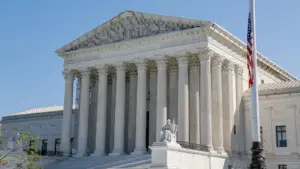A pivotal climate lawsuit is concluded as the Supreme Court declines to hear the Juliana case, directed by a group of young advocates against governmental fossil fuel policies.
A Landmark Climate Case Closes: Supreme Court Refuses Appeal

A Landmark Climate Case Closes: Supreme Court Refuses Appeal
Supreme Court's Inaction Ends Landmark Youth-Led Climate Case Journey
March 24, 2025, 5:12 p.m. ET - In a significant ruling on Monday, the Supreme Court announced it would not hear an appeal regarding the Juliana v. United States case, effectively closing a decade-long legal battle initiated by a coalition of 21 young Americans. This landmark case asserted that U.S. government policies surrounding fossil fuels infringe on constitutional rights, particularly in consideration of climate change.
Despite its dismissal by the Ninth Circuit Court of Appeals in 2020, which stated that such matters should be resolved through political avenues rather than judicial channels, the Juliana case catalyzed various other climate lawsuit strategies that have achieved more favorable outcomes in different courts. The plaintiffs claimed that continued governmental endorsements of fossil fuels threatened their futures and violated their rights as citizens.
Legal representatives from Our Children’s Trust, the Oregon-based nonprofit law firm advocating for the young plaintiffs, had sought to overturn the ruling in hopes of bringing the case to trial. Their request was firmly denied by the Supreme Court on Monday. Many analysts had raised concerns that the conservative justices might use the case as precedent to dismantle established environmental protections, thus posing a risk to the broader climate movement.
The outcome of the Juliana case highlights the evolving nature of climate litigation, underscoring the challenges faced by environmental advocates in the quest for justice and systemic reform at the federal level.
Despite its dismissal by the Ninth Circuit Court of Appeals in 2020, which stated that such matters should be resolved through political avenues rather than judicial channels, the Juliana case catalyzed various other climate lawsuit strategies that have achieved more favorable outcomes in different courts. The plaintiffs claimed that continued governmental endorsements of fossil fuels threatened their futures and violated their rights as citizens.
Legal representatives from Our Children’s Trust, the Oregon-based nonprofit law firm advocating for the young plaintiffs, had sought to overturn the ruling in hopes of bringing the case to trial. Their request was firmly denied by the Supreme Court on Monday. Many analysts had raised concerns that the conservative justices might use the case as precedent to dismantle established environmental protections, thus posing a risk to the broader climate movement.
The outcome of the Juliana case highlights the evolving nature of climate litigation, underscoring the challenges faced by environmental advocates in the quest for justice and systemic reform at the federal level.





















